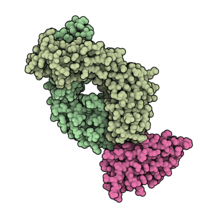Durvalumab
 Antigen-binding fragment of durvalumab (pale green) in complex with PD-L1 (pink). PDB: 5X8M. | |
| Monoclonal antibody | |
|---|---|
| Type | Whole antibody |
| Source | Human |
| Target | CD274 |
| Clinical data | |
| Trade names | Imfinzi |
| Other names | MEDI4736, MEDI-4736 |
| AHFS/Drugs.com | Monograph |
| MedlinePlus | a617030 |
| License data |
|
| Pregnancy category |
|
| Routes of administration | Intravenous |
| ATC code | |
| Legal status | |
| Legal status | |
| Identifiers | |
| CAS Number | |
| PubChem CID | |
| IUPHAR/BPS | |
| DrugBank | |
| ChemSpider |
|
| UNII | |
| KEGG | |
| Chemical and physical data | |
| Formula | C6502H10018N1742O2024S42 |
| Molar mass | 146322.36 g·mol−1 |
Durvalumab[4] (trade name Imfinzi) is an FDA-approved immunotherapy for cancer, developed by Medimmune/AstraZeneca.[5] It is a human immunoglobulin G1 kappa (IgG1κ) monoclonal antibody that blocks the interaction of programmed cell death ligand 1 (PD-L1) with the PD-1 (CD279).
Durvalumab is known as a checkpoint inhibitor drug.[6]
Medical uses
The US Food and Drug Administration (FDA) has approved durvalumab for certain types of bladder and lung cancer:[2]
- Adults with locally advanced or metastatic urothelial carcinoma who either have disease progression during or following platinum-containing chemotherapy or have disease progression within 12 months of neoadjuvant or adjuvant treatment with platinum-containing chemotherapy.
- Adults with unresectable, Stage III non-small cell lung cancer whose disease has not progressed following concurrent platinum-based chemotherapy and radiation therapy.
- In combination with etoposide and either carboplatin or cisplatin, as first-line treatment for adults with extensive-stage small cell lung cancer.
Clinical trials
A phase IB clinical trial of durvalumab and tremelimumab showed some activity in non-small cell lung cancer (NSCLC).[7] Phase 1 data in advanced metastatic urothelial bladder (Study 1108) has led to FDA breakthrough therapy designation.[6][8] Early results of a phase I trial combining durvalumab and gefitinib in lung cancer patients "showed promise".[9] A phase I clinical trial is currently underway using durvalumab with a TLR 7/8 agonist (MEDI 9197) for solid tumors.[10] A Phase 1b/2a trial is underway combining durvalumab with an HPV DNA vaccine (MEDI 0457) in patients with HPV-associated recurrent/metastatic head and neck cancer.[11]
In July 2017, AstraZeneca announced that a phase III trial of durvalumab with tremelimumab as a first-line treatment of non-small cell lung cancer failed to meet its primary endpoint of progression-free survival.[12]
In November 2017, the double-blinded phase III AstraZeneca PACIFIC clinical trial demonstrated the efficacy of durvalumab in the treatment of stage III non-small cell lung cancer.[13] 709 patients with stage III NSCLC who did not have disease progression after two or more cycles of a platinum-based chemotherapy were randomly assigned to receive durvalumab or a placebo as consolidation therapy for their lung cancer. Durvalumab increased the median progression-free survival from 5.6 months (placebo) to 16.8 months (durvalumab); the 12 month progression-free survival rate was increased from 35.3% (placebo) to 55.9% (durvalumab), and the 18 month progression-free survival rate was increased from 27.0% (placebo) to 44.2% (durvalumab).[6] The median time to death or distant metastases was also increased from 14.6 months (placebo) to 23.2 months (durvalumab). Extreme side effects were also increased from 26.1% of patients (placebo) to 29.9% of patients (durvalumab).
References
- ^ a b "Durvalumab (Imfinzi) Use During Pregnancy". Drugs.com. 30 August 2019. Retrieved 7 February 2020.
- ^ a b "Imfinzi- durvalumab injection, solution". DailyMed. 5 June 2020. Retrieved 30 September 2020.
- ^ "Imfinzi EPAR". European Medicines Agency (EMA). Retrieved 30 September 2020.
- ^ World Health Organization (2014). "International Nonproprietary Names for Pharmaceutical Substances (INN). Proposed INN: List 112" (PDF). WHO Drug Information. 28 (4).
- ^ Research, Center for Drug Evaluation and. "Approved Drugs - Durvalumab (Imfinzi)". www.fda.gov. Retrieved 6 May 2017.
- ^ a b c Syn, Nicholas L; Teng, Michele W L; Mok, Tony S K; Soo, Ross A (2017). "De-novo and acquired resistance to immune checkpoint targeting". The Lancet Oncology. 18 (12): e731–e741. doi:10.1016/s1470-2045(17)30607-1. PMID 29208439.
- ^ "Astrazeneca's combination of durvalumab with tremelimumab shows clinical activity in non-small cell lung cancer irrespective of PD-L1 status. Feb 2016".
- ^ AstraZeneca's (AZN) Durvalumab Granted FDA Breakthrough Therapy Designation. StreeInsider.com Corporate News, FDA, Management Comments. 17 February 2016.
- ^ "Promising Drug for Lung Cancer and Mesothelioma Patients". 19 May 2016.
- ^ Clinical trial number NCT02556463 for "A Study of MEDI9197 in Subjects With Solid Tumors or CTCL and in Combination With Durvalumab and/or Palliative Radiation in Subjects With Solid Tumors" at ClinicalTrials.gov
- ^ Clinical trial number NCT03162224? for "Safety and Efficacy of MEDI0457 and Durvalumab in Patients With HPV Associated Recurrent/Metastatic Head and Neck Cancer" at ClinicalTrials.gov
- ^ "AstraZeneca reports initial results from the ongoing MYSTIC trial in Stage IV lung cancer". www.astrazeneca.com.
- ^ "AstraZeneca presents superior progression-free survival for Imfinzi in the PACIFIC trial of patients with locally-advanced unresectable lung cancer at ESMO 2017 Congress". www.astrazeneca.com. September 2017.
External links
- "Durvalumab". Drug Information Portal. U.S. National Library of Medicine.
- "Durvalumab". NCI Drug Dictionary. National Cancer Institute.</ref>
- "Durvalumab". National Cancer Institute.
